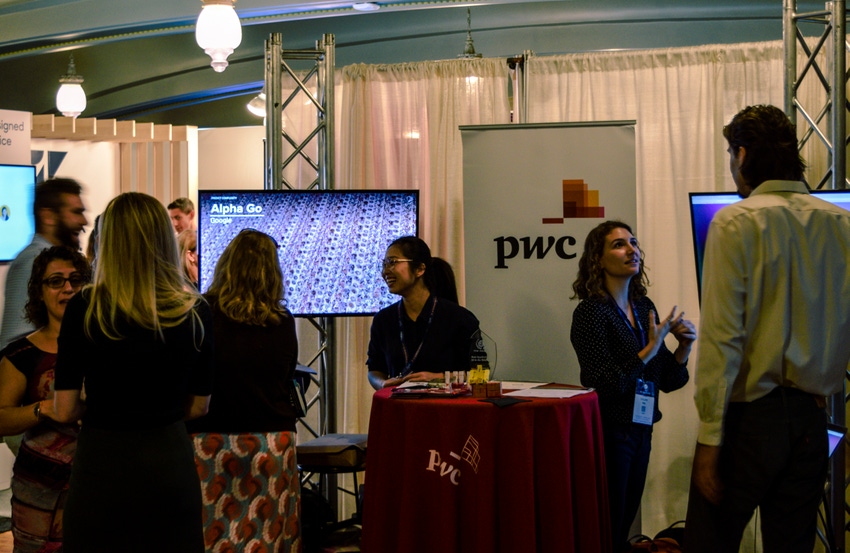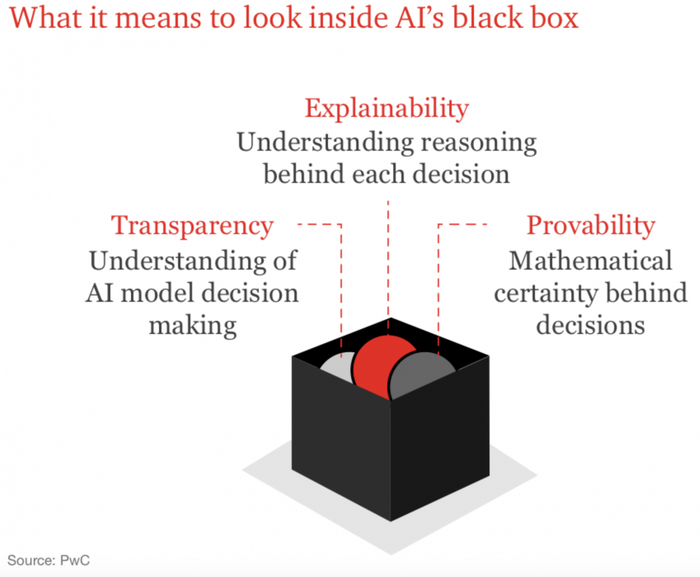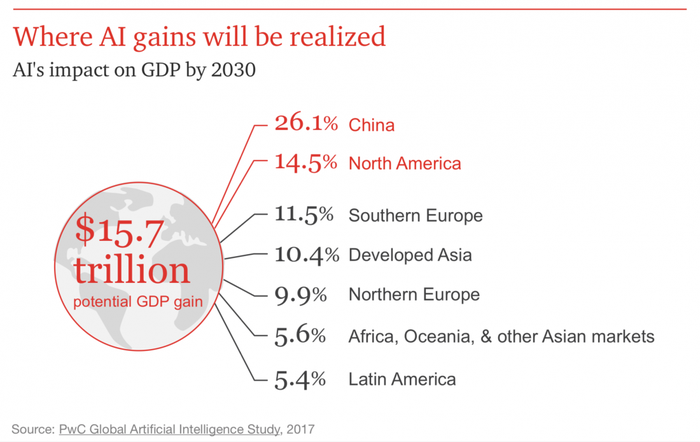#WorkNotJobs: PwC's 8 AI Predictions for 2018
#WorkNotJobs: PwC's 8 AI Predictions for 2018
January 19, 2018

Following on from their cutting-edge industry research into AI in 2017, as well as an exclusive Future of Work feature interview with AI Business, PwC's AI Programme have produced one of their first major reports for 2018. '8 AI Predictions for 2018' compiles survey data from hundreds of business executives worldwide, along with measuring trends in the AI thoughtspace and the strategic / technological shifts taking place across global enterprises.
"AI is remarkably complex and advancing quickly," the report says. "It's doing far more in some areas, and far less in others, than anyone would have guessed a decade ago. It's impossible for anyone today to give a precise vision of how the next ten - much less five - years will unfold. That's not to say that it's impossible to make broad predictions about AI's impact in the coming years and decades. We've done that elsewhere."
"Our aim here is different: to make specific predictions about AI trends for the next 12 months, then draw out key implications for business, government, and society as a whole. We're confident in making near-term forecasts because these nascent trends are already underway, though they aren't yet attracting the attention they deserve."
1. AI will impact employers before it impacts employment
"This upskilling won't just teach new skills. It will teach a new mindset that emphasizes collaboration with coworkers - and with AI."
The first prediction involves the need for organizations to quickly adapt their strategy to ensure their workforce operates on an AI-ready model. PwC discuss the need for a multidisciplinary team-based approach to AI, which will see organizations upskilling their employees and introducing AI-human 'centaurs', or personnel who are able to receive actionable advice from an AI 'partner.' Most importantly, it is 'forward-thinking' organizations that break down silos 'that separate data into cartels and employees into isolated units'.
2. AI will come down to earth - and get to work
"Executives think that AI will be crucial for their success: 72% believe it will be the business advantage of the future. The question is: What can it do for me today? And the answer is here."
PwC predict that AI will play a key role in automating rote and repetitive tasks. The value of AI in 2018, they argue, lies "not in creating entire new industries [but] rather in empowering current employees to add more value to existing enterprises." Business problems can already be solved with AI, and it is the search for new solutions to unique problems - and a need for clearer ROI measures - that will push organizations into deploying the technology.
3. AI will help answer the big question about data
"That's how many organizations will ultimately reform data architecture and governance: with AI and other technologies offering value propositions that require it."
While the last few years have seen data become one of the supposedly most valuable resources to a business, many companies haven't seen the payoff from their investments just yet. PwC argue that this is to do with a steep learning curve, immature tools, and 'considerable' organizational challenges. AI offers a path forward for business' data strategy because AI adds huge value to data - making it actionable.
https://twitter.com/robmccargow/status/953783544056344583
4. Functional specialists, not techies, will decide the AI talent race
"As AI spreads into more specific areas, it will require knowledge and skill sets that data scientists and AI specialists usually lack."
As the business use cases for AI become clearer, the need for functional expertise across the enterprise will be significant. Thanks to more user friendly interfaces, 2018 will be the year organizations onboard their domain experts with AI technologies on a day-to-day basis. PwC believe that, while businesses will still need a small team of data scientists, it will be the ability of stakeholders to introduce AI to their everyday work processes that determines AI deployment and success in 2018.
5. Cyberattacks will be more powerful because of AI - but so will cyberdefense
"The more AI advances, the more its potential for cyberattacks grows too."
While AI technologies have already been proved to have a wide range of applications in hacking, PwC believe that companies' ability to defend themselves with scalable machine learning techniques and real-time threat detection and analysis. They argue powerfully that if attackers are using AI, defenders will have to use it too. As a result, cybersecurity concerns could speed up AI's acceptance, forcing companies to get onboard with the technology as a cybersecurity measure.

6. Opening AI's black box will become a priority
"If AI should always be controllable, it's not always understandable. Many AI algorithms are beyond human comprehension."
2017 saw a great deal of attention dedicated to 'black box' algorithms - so-called because, while they enable AI programmes to reach a decision, end users rarely know how it reached that decision. While this isn't always a problem, it's a key issue for trust in AI. PwC expect that organizations will face increasing pressure from users and regulators to deploy AI that is explainable, transparent, and provable. They recommend that enterprises develop a framework for AI explainability decisions.
7. Nations will spar over AI
"If China starts to produce leading AI developments, the West may respond. Whether it's a 'Sputnik moment' or a more gradual realization that they're losing their lead, policymakers may feel pressure to change regulations and provide funding for AI.'
Following estimates of the huge potential impact of AI technologies on the global economy, the race is already on between different countries to emerge as global AI leaders. From China and Japan to Canada, the UK, and Germany, PwC outline the different national AI strategies already emerging - and predict that 2018 will see both national competition and collaboration as a result.

8. Pressure for responsible AI won't be on tech companies alone
"Leaders will soon have to answer tough questions about AI."
With CEOs predicting AI and automation to produce some degree of vulnerability and disruption in the way they do business, many organizations are going to start witnessing a demand for responsible, reliable, and transparent AI. PwC contextualize this in the 'global movement' for responsible AI, as mirrored in the rise of international non-profits and research groups dedicated to maximizing AI's benefits and minimalizing its risks for humanity. These measures in 2018 will include extensive testing, transparency, monitoring, data privacy measures, and the development of tools and standards for 'auditing' algorithms. This will ultimately lead to more public-private partnerships and a need for organizations to self-regulate.
Read the full report here: PwC's 8 AI Predictions For 2018

About the Author(s)
You May Also Like


.jpg?width=700&auto=webp&quality=80&disable=upscale)
.jpg?width=700&auto=webp&quality=80&disable=upscale)
.jpg?width=700&auto=webp&quality=80&disable=upscale)
.jpg?width=300&auto=webp&quality=80&disable=upscale)
.jpg?width=300&auto=webp&quality=80&disable=upscale)
.jpg?width=300&auto=webp&quality=80&disable=upscale)
.jpg?width=300&auto=webp&quality=80&disable=upscale)
.jpg?width=300&auto=webp&quality=80&disable=upscale)